- Home
- Joseph Conrad
Romance Page 7
Romance Read online
Page 7
The gallows themselves stood high enough to be seen—a long very stout beam supported by posts at each end. There was a blazing sun, and the crowd pushed and shouted and craned its thousands of heads every time one heard the cry of "Here they come," for an hour or so. There was a very limpid sky, a very limpid sea, a scattering of shipping gliding up and down, and the very silent hills a long way away. There was a large flavour of Spaniards among the crowd. I got into the middle of a knot of them, jammed against the wheels of one of the carriages, standing, hands down, on tiptoe, staring at the long scaffold. There were a great many false alarms, sudden outcries, hushing again rather slowly. In between I could hear someone behind me talk Spanish to the occupants of the carriage. I thought the voice was Ramon's, but I could not turn, and the people in the carriage answered in French, I thought. A man was shouting "Cool Drinks" on the other side of them.
Finally, there was a roar, an irresistible swaying, a rattle of musket ramrods, a rhythm of marching feet, and the grating of heavy iron-bound wheels. Seven men appeared in sight above the heads, clinging to each other for support, and being drawn slowly along. The little worsted balls on the infantry shakos bobbed all round their feet. They were a sorry-looking group, those pirates; very wild-eyed, very ragged, dust-stained, weather-beaten, begrimed till they had the colour of unpolished mahogany. Clinging still to each other as they stood beneath the dangling ropes of the long beam, they had the appearance of a group of statuary to forlorn misery. Festoons of chains completed the "composition."
One was a very old man with long yellow-white hair, one a negro whose skin had no lustre at all. The rest were very dark-skinned, peak-bearded, and had long hair falling round their necks. A soldier with a hammer and a small anvil climbed into the cart, and bent down out of sight. There was a ring of iron on iron, and the man next the very old man raised his arms and began to speak very slowly, very distinctly, and very mournfully. It was quite easy to understand him; he declared his perfect innocence. No one listened to him; his name was Pedro Nones. He ceased speaking, and someone on a horse, the High Sheriff, I think, galloped impatiently past the cart and shouted. Two men got into the cart, one pulled the rope, the other caught the pirate by the elbows. He jerked himself loose, and began to cry out; he seemed to be lost in amazement, and shrieked:
"Adonde está el padre?... Adonde está el padre?" No one answered; there wasn't a priest of any denomination; I don't know whether the omission was purposed. The man's face grew convulsed with agony, his eyeballs stared out very white and vivid, as he struggled with the two men. He began to curse us epileptically for compassing his damnation. A hoarse patter of Spanish imprecations came from the crowd immediately round me. The man with the voice like Ramon's groaned in a lamentable way; someone else said, "What infamy . . . what infamy!"
An aged voice said tremulously in the carriage, "This shall be a matter of official remonstrance." Another said, "Ah, these English heretics!"
There was a forward rush of the crowd, which carried me away. Someone in front began to shout orders, and the crowd swayed back again. The infantry muskets rattled. The commotion lasted some time. When it ceased, I saw that the man about to die had been kissing the very old man; tears were streaming down the gray, parchment-coloured cheeks. Pedro Nones had the rope round his neck; it curved upwards loosely towards the beam, growing taut as the cart jolted away. He shouted:
"Adiôs, viejo, para siempre adi———"
My whole body seemed to go dead all over. I happened to look downwards at my hands; they were extraordinarily white, with the veins standing out all over them. They felt as if they had been sodden in water, and it was quite a long time before they recovered their natural colour. The rest of the men were hung after that, the cart jolting a little way backwards and forwards and growing less crowded after every journey. One man, who was very large framed and stout, had to go through it twice because the rope broke. He made a good deal of fuss. My head ached, and after the involuntary straining and craning to miss no details was over, I felt sick and dazed. The people talked a great deal as they streamed back, loosening over the broader stretch of pebbles; they seemed to wish to remind each other of details. I have an idea that one or two, in the sheer largeness of heart that seizes one after occasions of popular emotions, asked me in exulting voices if I had seen the nigger's tongue sticking out.
Others thought that there wasn't very much to be exultant over. We had not really captured the pirates; they had been handed over to the admiral by the Havana authorities—as an international courtesy I suppose, or else because they were pirates of no account and short in funds, or because the admiral had been making a fuss in front of the Morro. It was even asserted by the anti-admiral faction that the seven weren't pirates at all, but merely Cuban mauvais sujets, hawkers of derogatory coplas, and known freethinkers. In any case, excited people cheered the High Sheriff and the returning infantry, because it was pleasant to hang any kind of Spaniard. I got nearly knocked down by the kettle-drummers, who came through the scattering crowd at a swinging quick-step. As I cannoned off the drums, a hand caught at my arm, and someone else began to speak to me. It was old Ramon, who was telling me that he had a special kind of Manchester goods at his store. He explained that they had arrived very lately, and that he had come from Spanish Town solely on their account. One made the eighth of a penny a yard more on them than on any other kind. If I would deign to have some of it offered to my inspection, he had his little curricle just off the road. He was drawing me gently towards it all the time, and I had not any idea of resisting. He had been behind in the crowd, he said, beside the carriage of the commissioner and the judge of the Marine Court sent by the Havana authorities to deliver the pirates.
It was after that, that in Ramon's dusky store, I had my first sight of Seraphina and of her father, and then came my meeting with Carlos. I could hardly believe my eyes when I saw him come out with extended hand. It was an extraordinary sensation, that of talking to Carlos again. He seemed to have worn badly. His face had lost its moist bloom, its hardly distinguishable subcutaneous flush. It had grown very, very pale. Dark blue circles took away from the blackness and sparkle of his eyes. And he coughed, and coughed.
He put his arm affectionately round my shoulders and said, "How splendid to see you again, my Juan." His eyes had affection in them, there was no doubt about that, but I felt vaguely suspicious of him. I remembered how we had parted on board the Thames. "We can talk here," he added; "it is very pleasant. You shall see my uncle, that great man, the star of Cuban law, and my cousin Seraphina, your kinsfolk. They love you; I have spoken well of you." He smiled gayly, and went on, "This is not a place befitting his greatness, nor my cousin's, nor, indeed, my own." He smiled again. "But I shall be very soon dead, and to me it matters little." He frowned a little, and then laughed. "But you should have seen the faces of your officers when my uncle refused to go to their governor's palace; there was to have been a fiesta, a 'reception'; is it not the word? It will cause a great scandal."
He smiled with a good deal of fine malice, and looked as if he expected me to be pleased. I said that I did not quite understand what had offended his uncle.
"Oh, it was because there was no priest," Carlos answered, "when those poor devils were hung. They were canaille. Yes; but one gives that much even to such. And my uncle was there in his official capacity as a a plenipotentiary. He was very much distressed: we were all. You heard, my uncle himself had advised their being surrendered to your English. And when there was no priest he repented very bitterly. Why, after all, it was an infamy."
He paused again, and leant back against the counter. When his eyes were upon the ground and his face not animated by talking, there became lamentably insistent his pallor, the deep shadows under his eyes, and infinite sadness in the droop of his features, as if he were preoccupied by an all-pervading and hopeless grief. When he looked at me, he smiled, however.
"Well, at worst it is over, and my uncle is here in this
dirty place instead of at your palace. We sail back to Cuba this very evening." He looked round him at Ramon's calicos and sugar tubs in the dim light, as if he accepted almost incredulously the fact that they could be in such a place, and the manner of his voice indicated that he thought our governor's palace would have been hardly less barbarous. "But I am sorry," he said suddenly, "because I wanted you—you and all your countrymen—to make a good impression on him. You must do it yourself alone. And you will. You are not like these others. You are our kinsman, and I have praised you very much. You saved my life."
I began to say that I had done nothing at all, but he waved his hand with a little smile.
"You are very brave," he said, as if to silence me. "I am not ungrateful."
He began again to ask for news from home—from my home. I told him that Veronica had a baby, and he sighed.
"She married the excellent Rooksby?" he asked. "Ah, what a waste." He relapsed into silence again. "There was no woman in your land like her. She might have———- And to marry that—that excellent personage, my good cousin. It is a tragedy."
"It was a very good match," I answered.
He sighed again. "My uncle is asleep in there, now," he said, after a pause, pointing at the inner door. "We must not wake him; he is a very old man. You do not mind talking to me? You will wait to see them? Dona Seraphina is here, too."
"You have not married your cousin?" I asked.
I wanted very much to see the young girl who had looked at me for a moment, and I certainly should have been distressed if Carlos had said she was married.
He answered, "What would you have?" and shrugged his shoulders gently. A smile came into his face. "She is very willful. I did not please her, I do not know why. Perhaps she has seen too many men like me."
He told me that, when he reached Cuba, after parting with me on the Thames, his uncle, "in spite of certain influences," had received him quite naturally as his heir, and the future head of the family. But Seraphina, whom by the laws of convenience he ought to have married, had quite calmly refused him.
"I did not impress her; she is romantic. She wanted a very bold man, a Cid, something that it is not easy to have."
He paused again, and looked at me with some sort of challenge in his eyes.
"She could have met no one better than you," I said.
He waved his hand a little. "Oh, for that———-" he said deprecatingly. "Besides, I am dying. I have never been well since I went into your cold sea, over there, after we left your sister. You remember how I coughed on board that miserable ship."
I did remember it very well.
He went to the inner door, looked in, and then came back to me.
"Seraphina needs a guide—a controller—someone very strong and gentle, and kind and brave. My uncle will never ask her to marry against her wish; he is too old and has too little will. And for any man who would marry her—except one—there would be great dangers, for her and for him. It would need a cool man, and a brave man, and a good one, too, to hazard, perhaps even life, for her sake. She will be very rich. All our lands, all our towns, all our gold." There was a suggestion of fabulousness in his dreamy voice. "They shall never be mine," he added. "Vaya."
He looked at me with his piercing eyes set to an expression that might have been gentle mockery. At any rate, it also contained intense scrutiny, and, perhaps, a little of appeal. I sighed myself.
"There is a man called O'Brien in there," he said. "He does us the honour to pretend to my cousin's hand."
I felt singularly angry. "Well, he's not a Spaniard," I said.
Carlos answered mockingly, "Oh, for Spaniard, no. He is a descendant of the Irish kings."
"He's an adventurer," I said. "You ought to be on your guard. You don't know these bog-trotting fortune-hunters. They're the laughter of Europe, kings and all."
Carlos smiled again. "He's a very dangerous man for all that," he said. "I should not advise any one to come to Rio Medio, my uncle's town, without making a friend of the Señor O'Brien."
He went once more to the inner door, and, after a moment's whispering with someone within, returned to me.
"My uncle still sleeps," he said. "I must keep you a little longer. Ah, yes, the Señor O'Brien. He shall marry my cousin, I think, when I am dead."
"You don't know these fellows," I said.
"Oh, I know them very well," Carlos smiled, "there are many of them at Havana. They came there after what they call the '98, when there was great rebellion in Ireland, and many good Catholics were killed and ruined."
"Then he's a rebel, and ought to be hung," I said.
Carlos laughed as of old. "It may be, but, my good Juan, we Christians do not see eye to eye with you. This man rebelled against your government, but, also, he suffered for the true faith. He is a good Catholic; he has suffered for it; and in the Ever Faithful Island, that is a passport. He has climbed very high; he is a judge of the Marine Court at Havana. That is why he is here to-day, attending my uncle in this affair of delivering up the pirates. My uncle loves him very much. O'Brien was at first my uncle's clerk, and my uncle made him a juez, and he is also the intendant of my uncle's estates, and he has a great influence in my uncle's town of Rio Medio. I tell you, if you come to visit us, it will be as well to be on good terms with the Señor Juez O'Brien. My uncle is a very old man, and if I die before him, this O'Brien, I think, will end by marrying my cousin, because my poor uncle is very much in his hands. There are other pretenders, but they have little chance, because it is so very dangerous to come to my uncle's town of Rio Medio, on account of this man's intrigues and of his power with the populace."
I looked at Carlos intently. The name of the town had seemed to be familiar to me. Now I suddenly remembered that it was where Nicolas el Demonio, the pirate who was so famous as to be almost mythical, had beaten off Admiral Rowley's boats.
"Come, you had better see this Irish hidalgo who wants to do us so much honour,"—he gave an inscrutable glance at me,—"but do not talk loudly till my uncle wakes."
He threw the door open. I followed him into the room, where the vision of the ancient Don and the charming apparition of the young girl had retreated only a few moments before.
CHAPTER THREE
The room was very lofty and coldly dim; there were great bars in front of the begrimed windows. It was very bare, containing only a long black table, some packing cases, and half a dozen rocking chairs. Of these, five were very new and one very old, black and heavy, with a green leather seat and a coat of arms worked on its back cushions. There were little heaps of mahogany sawdust here and there on the dirty tiled floor, and a pile of sacking in one corner. Beneath a window the flap of an open trap-door half hid a large green damp-stain; a deep recess in the wall yawned like a cavern, and had two or three tubs in the right corner; a man with a blond head, slightly bald as if he had been tonsured, was rocking gently in one of the new chairs.
Opposite him, with his aged face towards us, sat the old Don asleep in the high chair. His delicate white hands lay along the arms, one of them holding a gold vinaigrette; his black, silver-headed cane was between his silk-stockinged legs. The diamond buckles of his shoes shot out little vivid rays, even in that gloomy place. The young girl was sitting with her hands to her temples and her elbows on the long table, minutely examining the motionlessness of a baby lizard, a tiny thing with golden eyes, whom fear seemed to have turned into stone.
We entered quietly, and after a moment she looked up candidly into my eyes, and placed her finger on her lips, motioning her head towards her father. She placed her hand in mine, and whispered very clearly:
"Be welcome, my English cousin," and then dropped her eyes again to the lizard.
She knew all about me from Carlos. The man of whom I had seen only the top of his head, turned his chair suddenly and glinted at me with little blue eyes. He was rather small and round, with very firm flesh, and very white, plump hands. He was dressed in the black clothes of a Spanish jud
ge. On his round face there was always a smile like that which hangs around the jaws of a pike—only more humorous. He bowed a little exaggeratedly to me and said:
"Ah, ye are that famous Mr. Kemp."
I said that I imagined him the more famous Señor Juez O'Brien.
"It's little use saying ye arren't famous," he said. His voice had the faint, infinitely sweet twang of certain Irishry; a thing as delicate and intangible as the scent of lime flowers. "Our noble friend"—he indicated Carlos with a little flutter of one white hand—"has told me what make of a dare-devil gallant ye are; breaking the skulls of half the Bow Street runners for the sake of a friend in distress. Well, I honour ye for it; I've done as much myself." He added, "In the old days," and sighed.
"You mean in the '98," I said, a little insolently.
O'Brien's eyes twinkled. He had, as a matter of fact, nearly lost his neck in the Irish fiasco, either in Clonmel or Sligo, bolting violently from the English dragoons, in the mist, to a French man-of-war's boats in the bay. To him, even though he was now a judge in Cuba, it was an episode of heroism of youth—of romance, in fact. So that, probably, he did not resent my mention of it. I certainly wanted to resent something that was slighting in his voice, and patronizing in his manner.
The old Don slumbered placidly, his face turned up to the distant begrimed ceiling.
"Now, I'll make you a fair offer," O'Brien said suddenly, after an intent study of the insolent glance that I gave him. I disliked him because I knew nothing about the sort of man he was. He was, as a matter of fact, more alien to me than Carlos. And he gave me the impression that, if perhaps he were not absolutely the better man, he could still make a fool of me, or at least make me look like a fool.
"I'm told you are a Separationist," he said. "Well, it's like me. I am an Irishman; there has been a price on my head in another island. And there are warrants out against you here for assaulting the admiral. We can work together, and there's nothing low in what I have in mind for you."

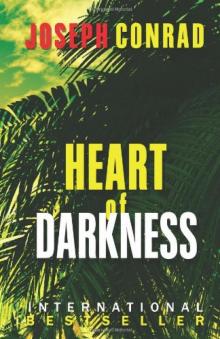 Heart of Darkness
Heart of Darkness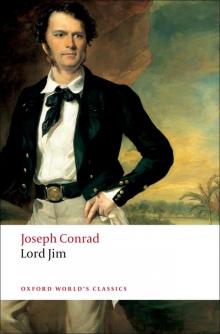 Lord Jim
Lord Jim The Nigger of the Narcissus (Echo Library)
The Nigger of the Narcissus (Echo Library) Victory (Dover Thrift Editions)
Victory (Dover Thrift Editions) Secret Agent
Secret Agent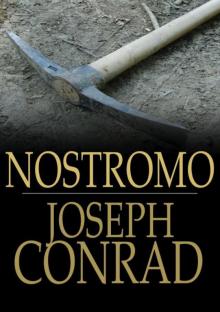 Nostromo
Nostromo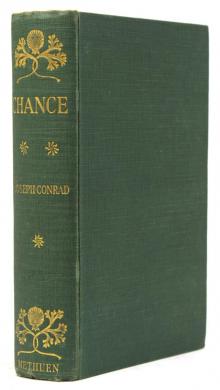 Chance: A Tale in Two Parts
Chance: A Tale in Two Parts Youth
Youth Almayer's Folly
Almayer's Folly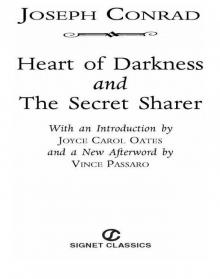 The Heart of Darkness and the Secret Sharer
The Heart of Darkness and the Secret Sharer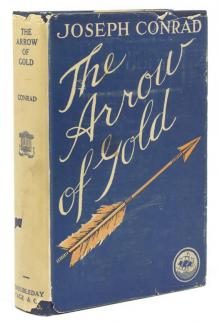 The Arrow of Gold: A Story Between Two Notes
The Arrow of Gold: A Story Between Two Notes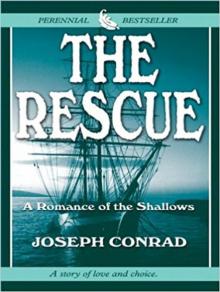 The Rescue: A Romance of the Shallows
The Rescue: A Romance of the Shallows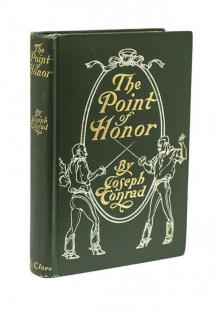 The Point Of Honor: A Military Tale
The Point Of Honor: A Military Tale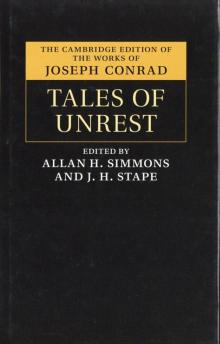 Tales of Unrest
Tales of Unrest Under Western Eyes
Under Western Eyes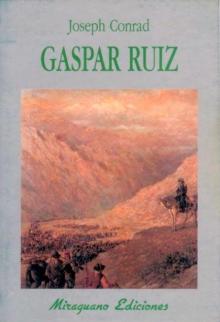 Gaspar Ruiz
Gaspar Ruiz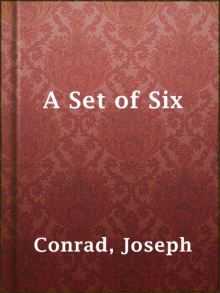 A Set of Six
A Set of Six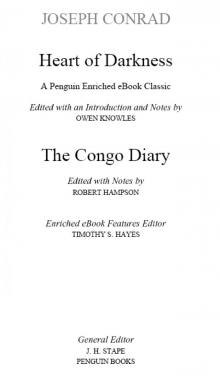 Heart of Darkness and the Congo Diary (Penguin Classics)
Heart of Darkness and the Congo Diary (Penguin Classics) Heart of Darkness and Selected Short Fiction
Heart of Darkness and Selected Short Fiction Typhoon
Typhoon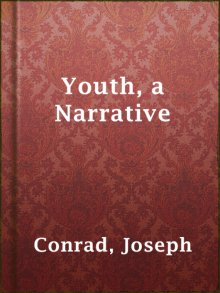 Youth, a Narrative
Youth, a Narrative Tomorrow
Tomorrow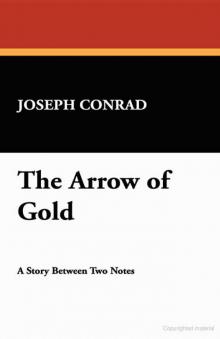 The Arrow of Gold
The Arrow of Gold The Shadow Line: A Confession
The Shadow Line: A Confession The Rescue
The Rescue Victory (Echo Library)
Victory (Echo Library) The Brute
The Brute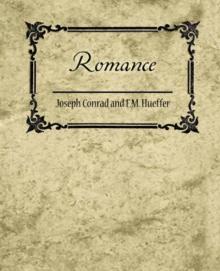 Romance
Romance A Personal Record
A Personal Record Lord Jim: A Tale
Lord Jim: A Tale Heart of Darkness and Selected Short Fiction (Barnes & Noble Classics Series)
Heart of Darkness and Selected Short Fiction (Barnes & Noble Classics Series) Within the Tides
Within the Tides The Secret Sharer and Other Stories
The Secret Sharer and Other Stories Falk
Falk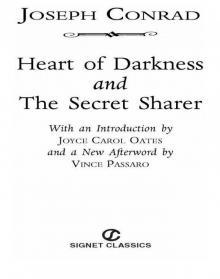 Heart of Darkness and The Secret Sharer
Heart of Darkness and The Secret Sharer Chance
Chance An Anarchist
An Anarchist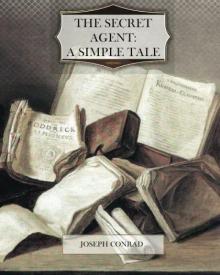 The Secret Agent: A Simple Tale
The Secret Agent: A Simple Tale The Secret Agent
The Secret Agent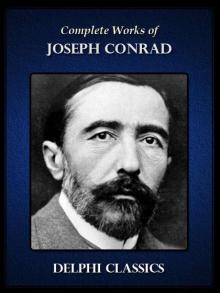 Complete Works of Joseph Conrad (Illustrated)
Complete Works of Joseph Conrad (Illustrated)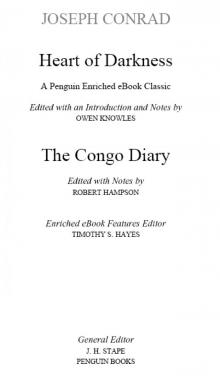 Heart of Darkness and the Congo Diary
Heart of Darkness and the Congo Diary Notes on Life & Letters
Notes on Life & Letters Typhoon (Single Story)
Typhoon (Single Story)